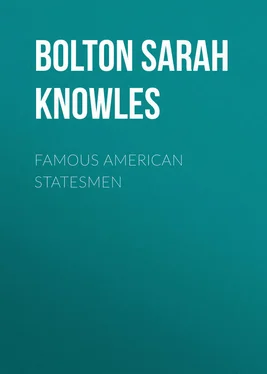Sarah Bolton - Famous American Statesmen
Здесь есть возможность читать онлайн «Sarah Bolton - Famous American Statesmen» — ознакомительный отрывок электронной книги совершенно бесплатно, а после прочтения отрывка купить полную версию. В некоторых случаях можно слушать аудио, скачать через торрент в формате fb2 и присутствует краткое содержание. ISBN: , Жанр: foreign_prose, foreign_antique, foreign_language, на английском языке. Описание произведения, (предисловие) а так же отзывы посетителей доступны на портале библиотеки ЛибКат.
- Название:Famous American Statesmen
- Автор:
- Жанр:
- Год:неизвестен
- ISBN:http://www.gutenberg.org/ebooks/39012
- Рейтинг книги:5 / 5. Голосов: 1
-
Избранное:Добавить в избранное
- Отзывы:
-
Ваша оценка:
- 100
- 1
- 2
- 3
- 4
- 5
Famous American Statesmen: краткое содержание, описание и аннотация
Предлагаем к чтению аннотацию, описание, краткое содержание или предисловие (зависит от того, что написал сам автор книги «Famous American Statesmen»). Если вы не нашли необходимую информацию о книге — напишите в комментариях, мы постараемся отыскать её.
Famous American Statesmen — читать онлайн ознакомительный отрывок
Ниже представлен текст книги, разбитый по страницам. Система сохранения места последней прочитанной страницы, позволяет с удобством читать онлайн бесплатно книгу «Famous American Statesmen», без необходимости каждый раз заново искать на чём Вы остановились. Поставьте закладку, и сможете в любой момент перейти на страницу, на которой закончили чтение.
Интервал:
Закладка:
When Patrick Henry was asked, on his return home, who was the greatest man in Congress, he replied: "If you speak of eloquence, Mr. Rutledge of South Carolina is by far the greatest orator; but if you speak of solid information and sound judgment, Colonel Washington is unquestionably the greatest man on that floor." Wise reading in all these years had given Washington "solid information," and "sound judgment" was partly an inheritance from noble Mary Washington.
People all through New England were arming themselves. General Gage, who had been sent to Boston with British troops, said: "It is surprising that so many of the other provinces interest themselves so much in this. They have some warm friends in New York, and I learn that the people of Charleston, South Carolina, are as mad as they are here." He was soon to possess a more thorough knowledge of the American character.
The Boston troops, under Gage, numbered about four thousand. He determined to destroy the military stores at Concord, on the night of April 18, 1775. It was to be done secretly, but as soon as the British regiment started, under Colonel Smith and Major Pitcairn, for Concord, the bells of Boston rang out, cannon were fired, and Paul Revere, with Prescott and Davis, rode at full speed in the bright moonlight to Lexington, to alarm the neighboring country. When cautioned against making so much noise, Revere replied: "You'll have noise enough here before long – the regulars are coming out."
Long before morning, nearly two-score of the villagers, under Captain Parker, gathered on the green, near the church, waiting for the red-coats, who came at double-quick, Major Pitcairn exclaiming, "Disperse, ye villains! Lay down your arms, ye rebels, and disperse!" Unmoved, Captain Parker said to his men, "Don't fire unless you are fired on; but if they want a war, let it begin here." The Revolutionary War began there, to end only when America should be free. Seven Americans were killed, nine wounded, and the rest were put to flight; but the blood shed on Lexington Green made liberty dear to every heart.
The British now marched to Concord, where, in the early morning, they found four hundred and fifty men gathered to receive them. Captain Isaac Davis, who said, when his company led the force, "I haven't a man that is afraid to go," was killed at the first shot, at the North Bridge.
The British troops destroyed all the stores they could find, though most had been removed, and then started toward Boston. All along the road the indignant Americans fired upon them from behind stone fences and clumps of bushes. Tired by their night march, having lost three hundred in killed and wounded, over three times as many as the Americans, they were glad to meet Lord Percy coming to their rescue with one thousand men. He formed a hollow square, and, faint and exhausted, the soldiers threw themselves on the ground within it, and rested.
The whole country seemed to rise to arms. Men came pouring into Boston with such weapons as they could find. Noble Israel Putnam of Connecticut left his plough in the field and hastened to the war.
May 10, Congress again met at Philadelphia. They sent a second petition to King George, which John Adams called an "imbecile measure." They made plans for the support of the army already gathered at Cambridge from the different States. Who should be the commander of this growing army? Then John Adams spoke of the gentleman from Virginia, "whose skill and experience as an officer, whose independent fortune, great talents, and excellent universal character, would command the approbation of all America, and unite the cordial exertions of all the colonies better than any other person in the Union." June 5, Washington was unanimously elected commander-in-chief.
Rising in his seat, and thanking Congress, he modestly said: "I beg it may be remembered by every gentleman in the room that I this day declare, with the utmost sincerity, I do not think myself equal to the command I am honored with. As to pay, I beg leave to assure the Congress that, as no pecuniary consideration could have tempted me to accept this arduous employment, at the expense of my domestic ease and happiness, I do not wish to make any profit of it. I will keep an exact account of my expenses. Those, I doubt not, they will discharge, and that is all I desire." He wrote to his wife: "I should enjoy more real happiness in one month with you at home than I have the most distant prospect of finding abroad if my stay were to be seven times seven years. But as it has been a kind of destiny that has thrown me upon this service, I shall hope that my undertaking it is designed to answer some good purpose… I shall feel no pain from the toil or danger of the campaign; my unhappiness will flow from the uneasiness I know you will feel from being left alone." No wonder Martha Washington loved him; so brave that he could meet any danger without fear, yet so tender that the thought of leaving her brought intense pain.
He was now forty-three; the ideal of manly dignity. He at once started for Boston. Soon a courier met him, telling him of the battle of Bunker Hill – how for two hours raw militia had withstood British regulars, killing and wounding twice as many as they lost, and retreating only when their ammunition was exhausted. When Washington heard how bravely they had fought, he exclaimed: "The liberties of the country are safe." Under the great elm (still standing) at Cambridge, Washington took command of the army, July 3, 1775, amid the shouts of the multitude and the roar of artillery. His headquarters were established at Craigie House, afterward the home of the poet Longfellow. Here Mrs. Washington came later, and helped to lessen his cares by her cheerful presence.
The soldiers were brave but undisciplined; the terms of enlistment were short, thus preventing the best work. To provide powder was well-nigh an impossibility. For months Washington drilled his army, and waited for the right moment to rescue Boston from the hands of the British. Generals Howe, Clinton, and Burgoyne had been sent over from England. Howe had strengthened Bunker Hill, and, with little respect for the feelings of the Americans, had removed the pulpit and pews from the Old South Church, covered the floor with earth, and converted it into a riding-school for Burgoyne's light dragoons. They did not consider the place sacred, because it was a "meeting-house where sedition had often been preached."
The "right moment" came at last. In a single night the soldiers fortified Dorchester Heights, cannonading the enemy's batteries in the opposite direction, so that their attention was diverted from the real work. When the morning dawned of March 5, 1776, General Howe saw, through the lifting fog, the new fortress, with the guns turned upon Boston. "I know not what to do," he said. "The rebels have done more work in one night than my whole army would have done in one month."
He resolved to attack the "rebels" by night, and for this attack twenty-five hundred men were embarked in boats. But a violent storm set in, and they could not land. The next day the rain poured in torrents, and when the second night came Dorchester Heights were too strong to be attacked. The proud General Howe was compelled to evacuate Boston with all possible dispatch, March 17, the navy going to Halifax and the army to New York. The Americans at once occupied the city, and planted the flag above the forts. Congress moved a vote of thanks to Washington, and ordered a gold medal, bearing his face, as the deliverer of Boston from British rule.
The English considered this a humiliating defeat. The Duke of Manchester, in the House of Lords, said: "British generals, whose name never met with a blot of dishonor, are forced to quit that town, which was the first object of the war, the immediate cause of hostilities, the place of arms, which has cost this nation more than a million to defend."
Читать дальшеИнтервал:
Закладка:
Похожие книги на «Famous American Statesmen»
Представляем Вашему вниманию похожие книги на «Famous American Statesmen» списком для выбора. Мы отобрали схожую по названию и смыслу литературу в надежде предоставить читателям больше вариантов отыскать новые, интересные, ещё непрочитанные произведения.
Обсуждение, отзывы о книге «Famous American Statesmen» и просто собственные мнения читателей. Оставьте ваши комментарии, напишите, что Вы думаете о произведении, его смысле или главных героях. Укажите что конкретно понравилось, а что нет, и почему Вы так считаете.












